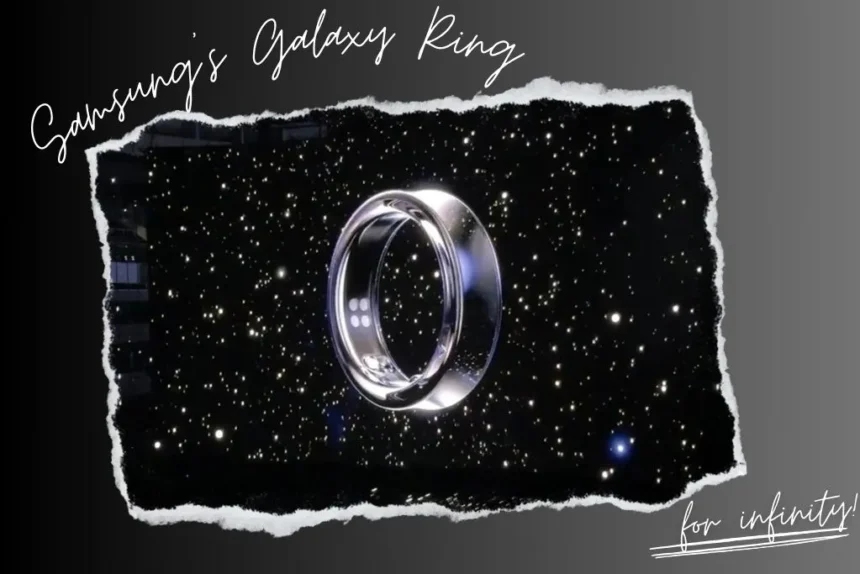Samsung’s Galaxy Ring, a major player in consumer electronics worldwide, has dominated the wearables sector for a considerable amount of time. With its cutting-edge fitness trackers and inventive smartwatches, the firm has continuously pushed the limits of technology. But the Samsung Galaxy Ring’s latest release has prompted discussion and raised worries among industry analysts and tech aficionados alike. Although the idea of a smart ring is appealing, Samsung appears to have made a mistake with the Galaxy Ring in the fiercely competitive wearable sector.
The Concept of the Samsung’s Galaxy Ring
The Galaxy Ring’s concept is to provide consumers with a small, covert gadget that has many of the features of a smartwatch. It seeks to track exercise activities, monitor health parameters, and deliver notifications without adding bulk to a wrist-worn gadget. This seems like the ideal answer for people looking for wearable technology that is more understated on paper. But there is a lot that could be done better with this concept’s execution.
Issues with Design and Usability
The Galaxy Ring’s design flaw is among its most obvious ones. A ring is spatially constrained by design, in contrast to a smartwatch, which has a comparatively large surface area to house a screen and sensors. Because of this restriction, many users find it uncomfortable to wear the gadget for extended periods of time. Another issue with the ring is its weight and size, particularly for people with little fingers.
Additionally, because the ring lacks a display, users are primarily dependent on their cellphones to engage with it. The convenience that wearables are meant to offer is undermined by this dependency. In comparison to standard smartwatches, the user experience is less fluid due to the difficulty in accessing notifications, health statistics, and other functionalities.
Limitations of Health and Fitness Tracking
Although Samsung has positioned the Galaxy Ring as a fitness and health tracker, there are doubts about this device’s functionality. The kind and precision of sensors that can be incorporated are limited by the tiny size of the ring. It is capable of monitoring heart rate and steps, among other basic metrics, but it is not as good at measuring blood oxygen levels, GPS tracking, or in-depth sleep study.
In addition, there has been disagreement on the veracity of the information gathered by the ring. Step counting and heart rate monitoring have been inconsistent, according to user reports, which calls into question the device’s dependability as a medical tool. These errors are a major turnoff for people who are health-conscious and fitness fanatic.
Concerns with Battery Life and Charging
Another crucial area where the Galaxy Ring falls short is battery life. The ring has a relatively small battery inside of its compact form factor, which limits its use life. For a wearable that is meant to be worn constantly, users have complained that they regularly, sometimes even daily, need to charge the device.
Another difficulty with the Galaxy Ring is charging it. The ring needs a specific charging cradle, unlike smartwatches that work with wireless or magnetic charging ports. Users may find it challenging to charge their device while on the road due to the lack of portability and convenience of this cradle.
Position in the Market and Competition
There are several well-established competitors in the fiercely competitive wearable sector who provide high-quality, dependable items. Competitors like Apple, Fitbit, and Garmin, who have all refined their wearable product lines across multiple product generations, present a serious threat to Samsung’s Galaxy Ring.
The Galaxy Ring seems to be an anomaly in this setting, not a game-changer. It is inferior to more sophisticated and feature-rich goods due to its flaws in design, usability, and functionality. The Galaxy Ring seems like a hurried and ill-considered product, especially coming from a corporation with Samsung’s resources and reputation.
Read more-
In summary
Although there are benefits to the idea of a smart band, the Samsung Galaxy band falls short in a number of important ways. Its poor health and fitness tracking, usability issues, and restricted design make it a mistake for Samsung in the wearable industry. It is obvious that the Galaxy Ring has fallen short of expectations as consumers continue to demand wearable technology that is more advanced and trustworthy. If Samsung wants to be successful in this rapidly growing market niche, it will have to start over and solve these problems.
